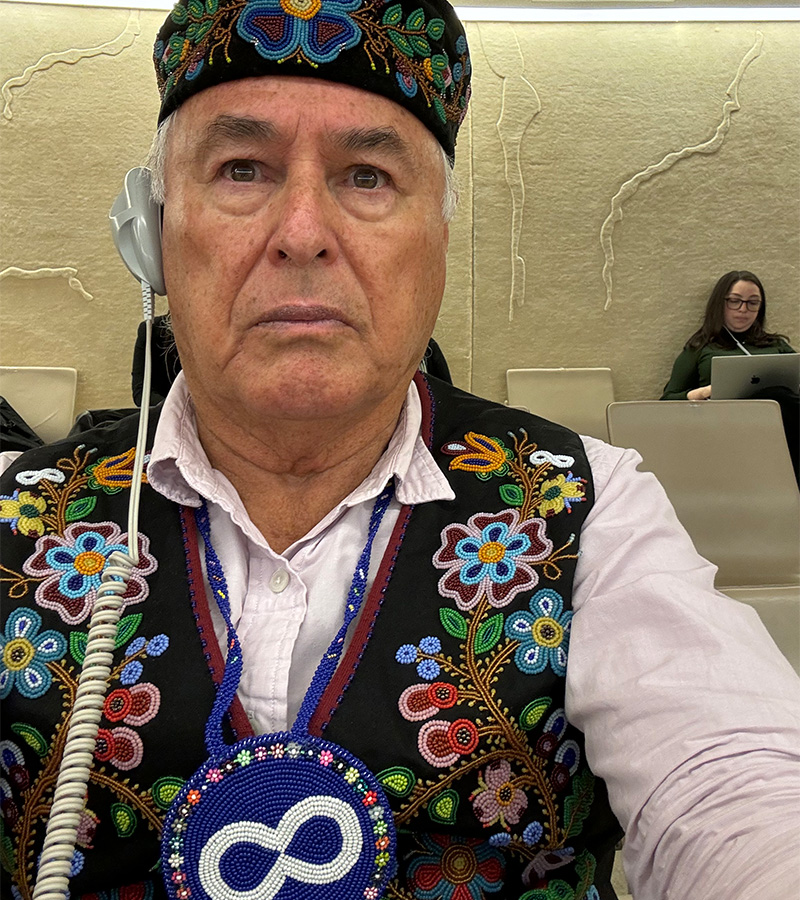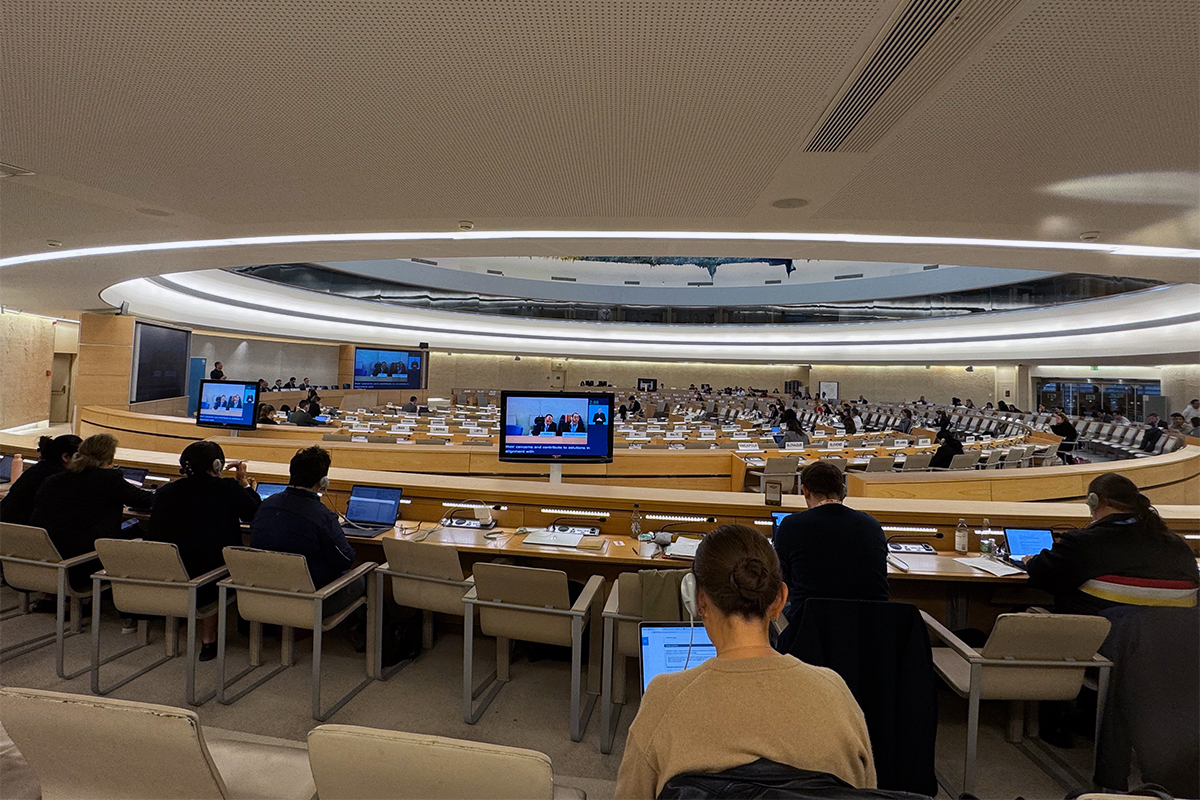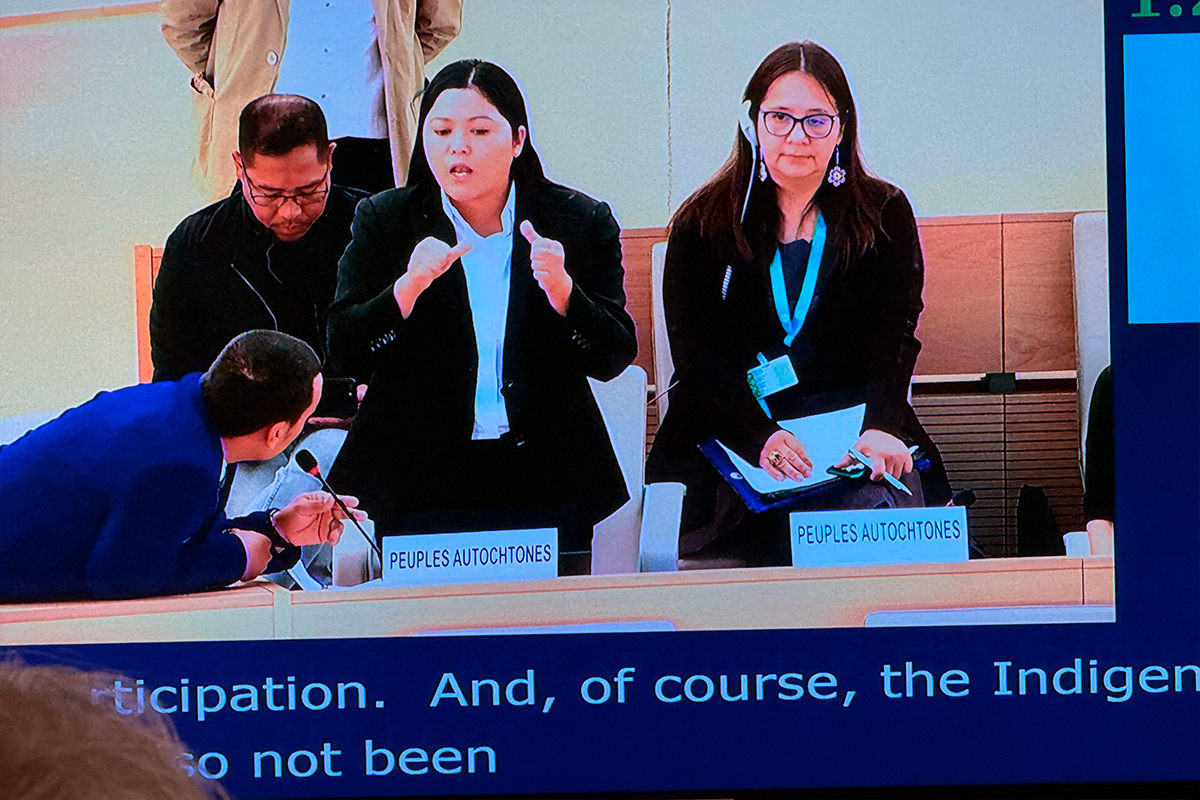- Home
- |
- Our Culture
- Louis Riel
- Métis Firsts in North America
- Métis Minute
- Who are we?
- Métis Nation Database
- Kids' Corner
- I Love to Bead Month
- |
- Departments / Affiliates
- Citizenship
- Culture & Heritage
- Early Learning & Child Care
- Economic Development
- Engagement and Consultation
- Energy, Infrastructure & Resource Management
- Health & Wellness
- Housing and Property Management
- Infinity Women Secretariat
- Louis Riel Capital Corporation
- Louis Riel College
- Louis Riel Institute
- MEDOCare Pharmacy
- Métis Child and Family Services Authority
- Métis Employment & Training
- Métis Justice Institute
- Métis Rights & Constitution
- Michif Language
- Provincial Education
- Red River Métis Business Development Corporation
- Red River Métis Community Resource
- Red River Métis Fur Company
- Red River Métis Veterans
- Riel House
- Sixties Scoop
- Youth
- |
- Government
- |
- Jobs
- |
- News
- |
- Contact
Ambassador Chartier attends Human Rights Council Meeting.
October 18, 2024

On October 17 and 18, 2024 Ambassador Clément Chartier attended the 2nd Intersessional Meeting of the Human Rights Council (HRC) of the United Nations in Geneva, Switzerland. This was the second of two intersessional meetings held to pursue the enhanced participation of Indigenous peoples in the Human Rights Council, and its subsidiary bodies.
The first one was held on July 18-19, 2024 the report of which was posted at that time on the MMF website. This October intersessional meeting was again preceded by two days of preparatory meetings by Indigenous delegates from around the world. There were approximately 100 Indigenous delegates in attendance. The UN Voluntary Fund for Indigenous Peoples sponsored 20 delegates from each of the seven (7) sociocultural regions around the world in which Indigenous peoples live.
These two meetings were special meetings of the Human Rights Council which is made up of 47 member states from 5 regions around the world, elected to these positions by the UN General Assembly. They regularly meet three times a year at the United Nations building in Geneva, Switzerland. These two special meetings are called intersessional, as they are meetings of the Council held between regular sessions. These two sessions were specifically dedicated to exploring the potential for the enhanced participation of Indigenous peoples within the Human Rights Council.

For this meeting, there were five sessions dedicated to specific agenda items, including accreditation principles and criteria; accreditation mechanism; venues of participation; participation modalities; and preventing and addressing reprisals; followed by a concluding session dealing with conclusions and recommendations. Each of these sessions were guided by prepared questions, as well as a discussion paper prepared by the July co-facilitators (Indigenous representative and Australia) based on the outcomes and proposals made at the July intersessional meeting with the objective of guiding the discussions at the October meeting.
Over the two-day meeting Ambassador Chartier made 4 interventions which can be found appended to this article.
The next stage will see the two co-facilitators (Indigenous representative and Canada), working with the Office of the High Commissioner for Human Rights drafting a joint report on the discussions, outcomes and recommendations made at the two intersessional meetings, along with specific recommendations which will be presented to the regular meeting of the HRC at its fifty-ninth session (June-July 2025).
At this time the HRC will decide next steps to be taken in this process.

Second Intersessional Meeting on Concrete ways to Enhance the Participation of Indigenous Peoples in the work of the Human Rights Council.
Palais des Nations, Geneva
October 17-18, 2024.
- Clément Chartier, Ambassador, Manitoba Métis Federation, the National Government of the Red River Métis
SESSION ONE: RECOMMENDATIONS TO THE HUMAN RIGHTS COUNCIL ON ACCREDITATION PRINCIPLES AND CRITERIA
The accreditation principles and criteria received a lot of attention in the July intersessional meeting and from our perspective captures generally what is required to guide the deliberations on the mechanism to be established.
We once again emphasize that no state or state government must be enabled to use enumerated principles or criteria as a way to define who Indigenous peoples are.
The basis of our right to participate, in an enhanced manner, in the work of the Human Rights Council and its subsidiary organs is our collective right of self-determination as peoples, something we have been calling for, for decades.
This of course has finally been acceded to by the UN General Assembly's adoption of the Declaration on the Rights of Indigenous Peoples in 2007.
This long overdue acknowledgement of our right to self-determine is the foundation upon which we must proceed as we forge a new relationship, with enhanced participation in the Human Rights Council as a good first step.
As such, any movement forward must clearly be based on our inherent rights as peoples, with our own institutions of governance and cannot be conflated with NGOs or groups of Indigenous individuals who may choose that form of organization for their own specific purposes or objectives. There is still room for them to participate in the work of the Human Rights Council through existing mechanisms, but not as representative governments of Indigenous peoples and nations.
Second Intersessional Meeting on Concrete ways to Enhance the Participation of Indigenous Peoples in the work of the Human Rights Council.
Palais des Nations, Geneva
October 17-18, 2024.
- Clément Chartier, Ambassador, Manitoba Métis Federation, the National Government of the Red River Métis
SESSION TWO: RECOMMENDATIONS TO THE HUMAN RIGHTS COUNCIL ON ACCREDITATION MECHANISM
As the Indigenous world is vast, it makes sense that an accreditation body must be guided by principles through which each of the seven sociocultural regions would be represented and serve as the primary leads in reviewing the accreditation applications from their respective regions.
We propose that the mechanism be composed of seven representatives, one each from the seven sociocultural regions, as selected by the Indigenous representatives from their respective regions through procedures which they so choose.
This could be coordinated by the Indigenous Coordinating Body (ICB) which has been instrumental in keeping this process moving forward on behalf of all Indigenous peoples.
We recommend that the HRC adopt a resolution next year that establishes this mechanism and incorporates in broad strokes the accreditation principles, venues of participation and participation modalities.
We know it will take some time for this new mechanism to become functional and that additional work may be required to arrive at a final resolution, hopefully no later than 2026, for the inauguration of the Mechanism in 2027.
In moving towards those milestones in 2025, 2026 and 2027 we propose that the Expert Mechanism on the Rights of Indigenous Peoples be mandated within the proposed 2025 resolution to act in a facilitative capacity in the on-going process leading to the finalization of the 2026 final resolution and the inauguration of the Mechanism in 2027, which will then commence the accreditation process.
Second Intersessional Meeting on Concrete ways to Enhance the Participation of Indigenous Peoples in the work of the Human Rights Council.
Palais des Nations, Geneva
October 17-18, 2024.
- Clément Chartier, Ambassador, Manitoba Métis Federation, the National Government of the Red River Métis
SESSION FIVE: Preventing and addressing reprisals.
I have been involved in attending UN meetings since 1976 and have heard firsthand during the 1970s and 80s the atrocities taking place in many Indigenous communities, including the destruction and/or relocation of Indigenous communities and the killings of large numbers of Indigenous peoples.
Certainly, the scale of those atrocities significantly diminished, for which we are all thankful.
However, the case remains that Indigenous leaders and human rights defenders in many instances are still targeted, especially where Indigenous lands and resources are coveted and where international mining companies are operating, many with state approval or states turning a blind eye.
Turning to the topic at hand, these past practices continue to rear their ugly heads where Indigenous leaders have faced persecution for attending UN meetings or forums, such as the Permanent Forum on Indigenous Issues and EMRIP.
This includes delegates being barred from returning to their countries of origin.
A recent incident occurred last year when one Indigenous leader after making an intervention at the Permanent Forum in New York was barred from returning home, thereby being denied the right to represent his people, organization and constituents.
This leader nevertheless made his way back to his homeland and continued carrying out his responsibilities, albeit on a clandestine basis because of that State's actions of reprisal. Several months later he was arrested by the state's security forces, and a year later his whereabouts or well-being is not known. Not even his family is provided any information about his circumstances.
The HRC must strengthen and exercise its mechanism or mechanisms for addressing acts of intimidation and reprisals against Indigenous leaders who participate in UN activities. This must include ensuring that the violating state provides proof of life of those detained, as well as taking them before an independent tribunal or mechanism which will ensure that the rule of law is both respected and applied. If necessary, sanctions should also be applied against offending states.
Second Intersessional Meeting on Concrete ways to Enhance the Participation of Indigenous Peoples in the work of the Human Rights Council.
Palais des Nations, Geneva
October 17-18, 2024.
- Clément Chartier, Ambassador, Manitoba Métis Federation, the National Government of the Red River Métis
Conclusions and recommendations to be made to the Human Rights Council.
A lot has been heard during these two intersessional meetings. My government proposes the that following 3 recommendations, as a minimum, be adopted by the HRC:
- That the enhanced participation of Indigenous peoples in the HRC and its subsidiary bodies be accorded the status of "Observer", with equal speaking status as "Observer States".
- That the HRC re-examine its mechanisms, procedures or policies with respect to reprisals generally, and further, that an Indigenous-specific rapid response protocol be adopted which activates immediate protection measures when a report of reprisal is received, including arbitrary and illegal detention. That this protocol contain guidelines encouraging member states to protect Indigenous representatives, along with procedures to hold offending States accountable, with clearly stated consequences if such violations occur.
- That the HRC adopt a clear path forward, which would include the preparation of a draft resolution to be tabled at its sixtieth session (September 2025) based on the results of these two intersessional meetings, which would include engaging EMRIP in a facilitative capacity to work with Member States and Indigenous peoples, including the Indigenous Coordinating Body (ICB), on the preparation of a draft final resolution for adoption by the Council in 2026.
The final draft 2026 resolution would create the Accreditation Mechanism, which we proposed be composed of seven (7) Indigenous representatives, one each from the seven sociocultural regions, with the accreditation principles, venues, modalities, etc being clearly spelled out.
The 2026 resolution providing for the creation of the Accreditation Mechanism could provide that the Mechanism be inaugurated in 2027, at which time it would begin the process of accepting Accreditation applications.
